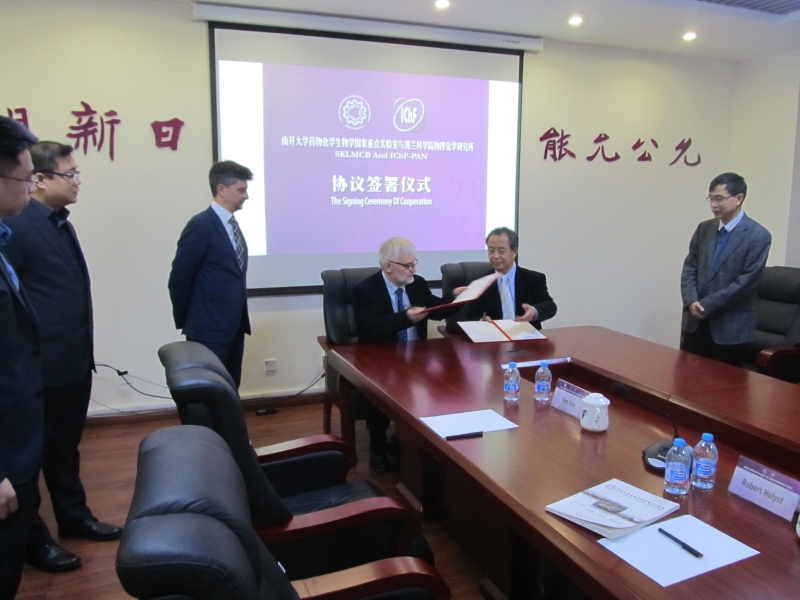IPC PAS starts cooperation with a leading university in China
Polish physical chemistry is joining forces with Chinese medical and molecular biology and biochemistry. In Tianjin an agreement has been signed on long-term cooperation between the Institute of Physical Chemistry of the Polish Academy of Sciences and Nankai University, one of the highest ranked research units in China.

The Institute of Physical Chemistry of the Polish Academy of Sciences (IPC PAS) in Warsaw has officially teamed up with the State Key Laboratory of Medicinal Chemical Biology (SKLMCB) operating at Nankai University, one of the best universities in China. The Polish-Chinese agreement, formalized in Tianjin in front of the cameras of state television, is the effect of several years of earlier cooperation of scientists from both centres. The agreement, signed by the directors of the Institutes: Prof. Luyuan Li and Prof. Marcin Opallo will, already in the near future, result in joint grants and increase the rate of exchanges of researchers between the two sides, and the IPC PAS will facilitate the expansion of interdisciplinary research activity to the field of biological sciences.
The State Key Laboratory of Medicinal Chemical Biology is one of two prestigious and well-funded key state laboratories at Nankai University (the other is the State Key Laboratory of Elemento-Organic Chemistry). The University was founded in 1919 and is regularly in the top ten of rankings covering over two thousand Chinese universities and institutes. Its most valued branch of science is chemistry. In turn, the Institute of Physical Chemistry of the Polish Academy of Sciences came into existence in 1955 as one of the first chemical institutes of the Polish Academy of Sciences. It is the largest chemical research institute in Poland, listed in the top three national institutions in the field of chemistry in the rankings of the Polish Ministry of Science and Higher Education.
“These days, no institute aiming to be modern can focus solely on its own, generally quite narrow, research subjects. That is why for a long time we have been interested in introducing physical chemistry into the sphere of medical and molecular biology and biochemistry. Since these are just the areas where Nankai University achieves excellent results, thanks to cooperation with such a renowned Chinese university we will be able to more effectively pursue our strategic goal: to transform the IPC PAS into a truly interdisciplinary unit, able to compete effectively within the ERA European Research Area,” says Prof. Opallo.
“We are deeply convinced that formal agreements should always be embedded on earlier collaboration, during which both sides have the opportunity to get to know each other and mutually assess both their capabilities and their research interests, as well as their degree of involvement,” adds Prof. Robert Holyst (IPC PAS) and stresses: “At the time of signing the agreement we had, with our Chinese partners, over 10 publications in prestigious journals such as ‘Scientific Reports’, belonging to the ‘Nature’ group. These publications came about thanks to two grants awarded by the Chinese side and the TEAM grant from the Foundation for Polish Science, under which talented researchers from China have been present at our Institute for a long time.”
“In Poland, I have met with the great kindness of people and the openness of the scientific system. I won a prestigious grant, earned my habilitation and have developed scientifically towards issues on the border of chemistry, physics and biology. I am deeply convinced that Polish-Chinese cooperation is worth promoting, because it brings tangible benefits to both sides,” says Dr. Sen Hou, Professor at the IPC PAS.
One of the members of the Polish delegation in Tianjin was Prof. Maciej Wojtkowski, winner of the Foundation for Polish Science Prize, awarded for his research on advanced methods of optical imaging. Prof. Wojtkowski has for more than half a year been engaged in the development of the Institute's new interdisciplinary unit: the Department of Physical Chemistry of Biological Systems.
“At Nankai University in Tianjin there are many groups dealing with issues that are interesting from our point of view. They are working on, among others, hydrogel materials with interesting optical properties. We believe that substances of this type may turn out to be useful, e.g. in the techniques we are developing of intravital biological imaging of the brains of small rodents, and potentially, even the human brain,” says Prof. Wojtkowski.
Prof. Wojtkowski is head of the Department of Physical Chemistry of Biological Systems as winner of the international competition organized within the framework of the European ERA Chairs grant. The grant, awarded to the IPC PAS as one of only three research institutions in Poland, has a value of 2.4 million euros and is part of Horizon 2020, the largest European funding program for research and innovation, with a budget of almost 80 billion euros. The long-term goal of ERA Chairs grants is to enhance the competitiveness of research units with a high potential to a level enabling effective competition with leading research centres in Europe and the world.
Preparation of the press release was financed by funds from the ERA Chair grant.
The Institute of Physical Chemistry of the Polish Academy of Sciences (http://www.ichf.edu.pl/) was established in 1955 as one of the first chemical institutes of the PAS. The Institute's scientific profile is strongly related to the newest global trends in the development of physical chemistry and chemical physics. Scientific research is conducted in nine scientific departments. CHEMIPAN R&D Laboratories, operating as part of the Institute, implement, produce and commercialise specialist chemicals to be used, in particular, in agriculture and pharmaceutical industry. The Institute publishes approximately 200 original research papers annually.
